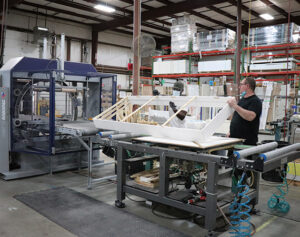Business developer Kurt Bear joined Enterprise Minnesota two years ago. He’s worked with Minnesota manufacturers since 1982 in executive positions. Some of his most valuable experience comes from helping companies transition through times of ownership change or succession.
“We’re all the sum of our experiences,” Bear says. “Wherever you’ve been, whatever you’ve done, that becomes your foundation.”
And for Bear, his past experiences are an opportunity to offer hard-won lessons, but also to warn against making the mistakes he’s made and witnessed.
“I’ve been through most of the things that keep business owners awake at night,” he says. “And it’s a great privilege to come alongside them and help them through the difficult circumstances they might find themselves in.”
Bear is able to put his vast experience to work at Enterprise Minnesota, where his consulting responsibility includes analyzing the needs of manufacturers and prescribing services that might help improve their productivity and their overall profitability. These services include expert guidance and insight in five key service areas: Strategy and Revenue Growth, Talent and Leadership, Manufacturing Peer Councils, Continuous Improvement, and Business Management Systems.
Most of his career since college has been spent with private, family-owned manufacturing companies, not unlike the clients he now works with every day.
He started studying engineering at UW Stout, then received a master in manufacturing engineering from St. Thomas, and eventually earned an MBA in finance. The University of St. Thomas was on his way home from work at Thermotech, in Hopkins, so instead of just picking up milk on the way home, he jokes, he picked up an MBA degree.
“[Before that] I didn’t have a full appreciation for the impact of finance on manufacturing,” Bear says. “It gave me a different perspective on the process.” JIT Manufacturing and Supply is mostly a cash management tool and a Zero Defects quality program in operations assures clean accounts receivables.
He’s worked with everything from thermoplastics and batteries to multimillion-dollar yachts and houseboats. At SkipperLiner Industries, he connected with a supplier, Mid-City Steel, to which he eventually moved. The owner was looking to retire but didn’t have any willing successors; a few years later, Bear and two others purchased the metal fabrication company where he grew revenue to over $30 million annually in 2012.
“It was a very worthwhile experience, helping owners and executives of Minnesota businesses. Because quite honestly, I think every business owner who’s 55 to 65 is trying to figure out, ‘What am I gonna do with my business?’ [Mid-City Steel] was a great transition, and Barry [the founder] was a great guy,” Bear says.
His lengthy co-ownership of Mid-City Steel and nearly 20 years of leadership experience make him a natural fit for working with Enterprise Minnesota’s peer councils. He was instrumental in forming a new council that meets in Owatonna.
Enterprise Minnesota has led manufacturing peer councils for the past 22 years. These small, candid, and confidential meetings offer manufacturing business leaders a place to meet, exchange ideas, and talk out problems. Some groups even tour each other’s facilities, sharing best practices and celebrating progress.
Today there are nine peer councils operating throughout the state, with 81 participants as of June this year.
Each is led by a facilitator and a second chair. Bear serves regularly as second chair for three groups: the Operations Management Council, the Owatonna PBA council made up of owners of manufacturing companies, and the Southern Minnesota Manufacturing Executives Peer Council. All meet in the southern portion of the state, usually in Mankato or Owatonna.
While Bear is passionate about his involvement, the meetings “are really for the members to hear from one another.”
“It’s just a great opportunity for the participants,” Bear says. “I know from my prior experiences that I wish I had been part of a peer council. I was not, and I see them as a really valuable opportunity. I believe they value the process of the peer council as they also connect with one another between meetings via email, etc.”
At the end of the day, Bear says he enjoys how Enterprise Minnesota can help initiate incremental improvements for his clients while they focus on their core, day-to-day operations.
“Those who attempt to self-perform and are successful are few and far between,” he says. “The most accomplished outcomes are from the wise use of trusted advisors like Enterprise Minnesota. I love it when a customer calls and asks if I have ever experienced a situation like theirs and then we find time to connect and brainstorm the situation for a desired outcome.”
…
Featured story in the Fall 2022 issue of Enterprise Minnesota magazine.


